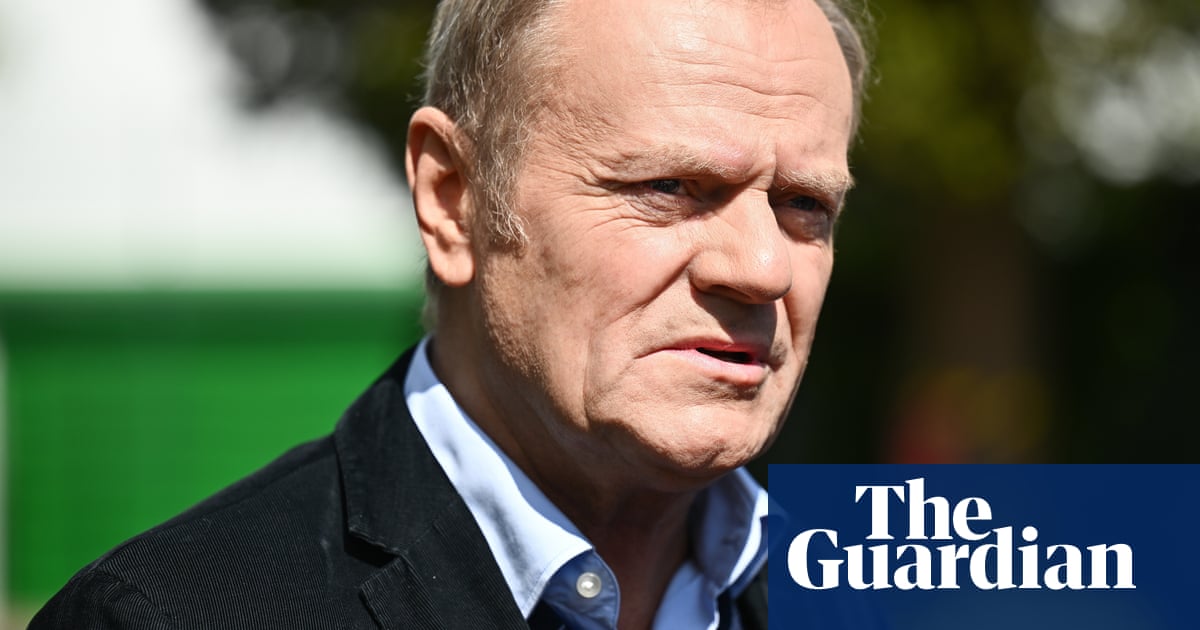The next two weeks will “decide the future of Poland”, its prime minister, Donald Tusk, has warned, as the country prepares for a presidential runoff vote on 1 June after a nail-bitingly close first round.
Official results released on Monday showed the pro-European centrist Rafał Trzaskowski, the mayor of Warsaw and candidate from Tusk’s Civic Coalition, received 31.36% of the votes. Narrowly trailing him was Karol Nawrocki, backed by the populist rightwing Law and Justice party (PiS), with 29.54% of the vote.
Trzaskowski had long beenseen as the frontrunner,whose election would allow Poland to end themonths-long standoffbetween the centrist-led parliament and populist right presidency.
Tusk and his coalitiontook powerin 2023, promising to reverse the erosion of democratic checks and balances that had marked PiS’s eight years in government.
Their efforts, however, have been in part stymied by the outgoing president,Andrzej Duda, a close ally of the previous PiS government and a supporter of Donald Trump. Duda has used his presidential veto to repeatedly block the new administration’s reforms, prompting Tusk to comment last month in parliament: “It’s hard to govern alongside a hostile president, with all those vetoes.”
The stalemate has loomed over the presidential election, turning the ballot into a question of whether voters want to carry through with the political overhaul that began in 2023 when PiS was ousted from power in the country’s parliament.
As the closer-than-anticipated result rolled in on Sunday night, Tusk took to social media to try to galvanise voters. Everything was at stake now, he wrote, adding that “the next two weeks will decide the future” ofPoland. “Not one step back!”he said.
On Monday, hours after the first-round results came in, the two candidates were back on the campaign trail. Trzaskowski was in the south-central city of Kielce, handing out sweet yeast buns amid promises of reforming judicial institutions and liberalising the country’s laws on abortion. Nawrocki was in Gdańsk, offering donuts to those drawn to his admiration for Trump, strong language against migration and pledges to crack down on “woke” liberal values.
It was a glimpse of what probably lies ahead for the country. “The campaign in the next two weeks will be very polarising and brutal – a confrontation of two visions of Poland: pro-EU, liberal and progressive versus nationalist, Trumpist and conservative,” Piotr Buras, head of the Warsaw office of the European Council on Foreign Relations, told the Associated Press.
Ahead of the runoff on 1 June, both candidates will have to adjust their campaigns to pick up votes, a complicated feat given the broad spectrum of candidates fielded in the first round. For Trzaskowski, the effort is made more difficult as rightwing and far-right candidates received just over half the votes in the first round.
Sign up toHeadlines Europe
A digest of the morning's main headlines from the Europe edition emailed direct to you every week day
after newsletter promotion
The supporters of Sławomir Mentzen, a libertarian radical-right candidate who came in third with 14.8% of Sunday’s vote, could prove key to the second round.A Eurosceptic who is staunchly opposed to abortion and migrants, Mentzen had taken aim at the country’s 1 million Ukrainian refugees, accusing them of taking advantage of Poland.
Just over 6% of voters backed Grzegorz Braun, catapulting the lawmaker from the far-right Confederation party into fourth place. Braun isunder investigationafter he used a fire extinguisher to put out Hanukah candles in the Polish parliament in protest against the celebration of Jewish holidays.
About 14% of votes were cast for the centre-right Szymon Hołownia, the New Left’s Magdalena Biejat and hard-left candidate Adrian Zandberg.
With two weeks left before voters return to the polls, it was anyone’s guess who might end up elected as president, said Aleks Szczerbiak, a professor of politics at the University of Sussex. “I think there’s absolutely everything to play for,” he said. “I think it’s completely neck and neck, and in many ways the campaign is just kind of resetting.”
